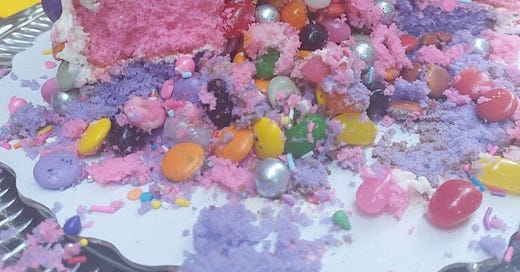This past weekend I hosted a party for the first time in, well, a very long time. It was awesome - we had a beautiful sunny day, the drinks were flowing, the food was great, and the cake was an over the top masterwork (if I do say so myself).
Mind you, it was a party for a pack of eight year olds. The beverage of choice was blue Kool-Aid with maraschino cherries, the meal was cheap pepperoni pizza, and the cake was so covered in sprinkles and candy it looked like a unicorn barfed on it. It was glorious.
But it having been so long since I hosted anything I agonized a bit. Did I get the right toys for the gift bags? Was anyone going to be allergic to the candy in the piñata? Was one little tray of veggies and dip enough? I was a little worried about what the other parents were going to think. Was the Technicolor sugar binge too much? Should I make more than a nod to a balanced meal?
On some level we are all afraid of being judged.
Why was I worried about having vegetables? Why on earth would I concern myself about the nutritional value of one Saturday lunch? It’s a kids party FFS, so of course it’s going to be a sugar-palooza. But I was still a bit insecure about it - was this level of indulgence slipping into “bad parent” territory?
It got me thinking about the messages we internalize about food and how insidious they can be. Think of all the industries that exist either in whole or in part to prey on those insecurities: fashion, cosmetics, fitness, automobiles, landscaping, real estate, dieting, wellness (whatever the hell that is) to name only a few.
Capitalism makes us insecure by design - if we were happy to have what we actually need no one would make any money. And I say that as a friend of the market-based economy. But what happens when the messages aren’t just about wanting more, but about being “better”?
Whether we are rich or poor, urban or rural, and regardless the colour of our skin and our level of woke-ness (or lack thereof) we all have to eat. And there’s only so much we can eat so there’s huge incentive to make us selective. To encourage that selectiveness the food industry uses loaded language to ascribe value to foods: words like “natural”, “healthy”, “organic”, “pure” and their ilk suggest there’s a “good” versus “bad” dynamic at play.
We throw phrases like “junk food” and “clean eating” around without thinking of the heavy meanings they carry.
“Organic” is a particularly loaded term. It doesn’t mean that something was grown or produced without pesticides or other dreaded “chemicals” in some pastoral idyll, but only that it doesn’t contain certain synthetic products. Is organic that much more nutritious? Studies say no. Is it that much more expensive? You bet. Does it make people feel good about themselves? Maybe. Does it make them better people? Also (and fascinatingly), no.
If we buy into the idea that conventional food is full of “toxins” and therefore “bad”, what does it say about me as a person (and as a parent) if I don’t buy organic food for my family? Do I not care about my health? Do I not love my child? Am I a bad parent if I don’t buy organic bananas at double the price?
Processed food also gets a bad rap. I’ve written before about the value of canned food, but it still carries a stigma because it’s not “fresh” (another one of those value-laden words). Frozen food is often an economical and equally healthy choice but it doesn’t have the feel-good fuzzies of a basketful of farmers market produce.
Even the most infamous of the processed foods are still better than going hungry and make more financial sense than many restaurant meals. They may be the best you can do on a particular day, or they may fill a particular need whether it’s convenience, comfort, or even nostalgia. They aren’t “bad” and none of those reasons are “bad” - they are just part of life.
And lest anyone be smug about how they set their priorities, remember that inflation is on the march and won’t be letting up any time soon. Unless you’re part of the 1% you are already making trade-offs that include your food budget, or you soon will be. And if you’ve got a mortgage, well, you probably know what’s coming. Single-estate bougie coffee doesn’t look so hot when it costs $150 to fill up the minivan.
There’s always room for self-examination when it comes to any complex topic, even more so when it’s one that is so intertwined with economics, culture, and values like food. With food costs continuing to rise now is the time to have that reckoning about what we eat and how we feel about it before our wallets make the decisions for us and leave us feeling bad about ourselves. We often know surprisingly little about the choices that others have to make so it only compassionate and right to assume that others are doing their best under their particular circumstances, just as you are. Judge not that ye not be judged and all that.
I’m not saying you shouldn’t spend money on food and nor am I saying you should feel bad about spending money on food (if you can afford it, that is). Rather what I’m asking is that you not assign moral value to your food. Seed-filled bread and organic kale doesn’t make you a good person just as squishy white bread and instant ramen doesn’t make you a bad person. Don’t worry about being judged, don’t judge others, and, if only this once, skip the veggies and eat more unicorn cake, sprinkles and all.



